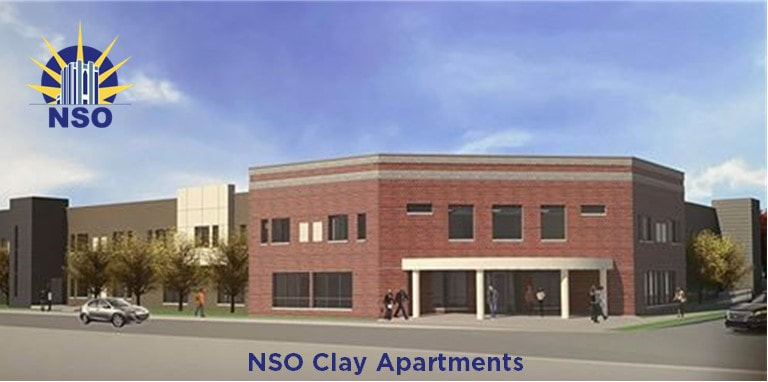 Allah Young, 69 of Detroit, slept in his own bed for the first time in over three years last fall. On October 9, Young stepped over his new apartment door threshold at 3364 Mack Ave. (near Gratiot in Detroit’s McDougall-Hunt neighborhood) and entered into his new life at Clay Apartments. The permanent supportive housing facility is a two-story, 42-unit housing complex for individuals who experienced homelessness. Young said that as a Black man who was homeless, drifting in and out of shelters, and living on the street or sleeping in vacant homes, life was rough. To add a pandemic on top of that, it was at times unbearable. He used to wonder why homeless people loitered around liquor stores; he found out afterward that they give shelter to the homeless along with drug houses.“I had property in Detroit; lost [the] house I had and went to shelters,” he said adding that he has been to nearly every shelter in the city of Detroit. Young, who had gainful employment for a number of years stopped working because he got involved in “negativity” he said. “One thing led to the next way,” he said, adding that the only way to come up out of it was going to shelter. “Part of the negativity was substance abuse. In situations like that, I would go cold turkey. … I got to a shelter during the process.” Young added that his father and brother were in the political realm and his father, a state representative, advocated for mental health reform in the 1980s, which Young needed help with throughout his life. Young said that his time spent on the streets gave him an understanding that no other experience could and he is empathetic of those who are still out there. “When you are in a shelter you have to leave the shelter every day at 5 a.m. [and you can be back by the evening],” he said. “It is difficult to wake up in the morning and be put out of a facility and have no destination. That puts you in an environment of negativity. … [It is a] no-win situation for people out on the street.” Young said that he gives Clay Apartments, operated under the Neighborhood Service Organization, credit for the kind people who help make him feel at home. “I felt that my [homeless] journey had ended,” he said. “It’s a privilege to be here and a privilege to pay your rent; to keep your place clean, keep yourself clean and resolve to live well — that has to be the end game.” Katrina McCree, chief community impact officer at NSO, said that homelessness is still very prevalent in the Detroit region and continues to “plague our community.” According to the Detroit Continuum of Care’s annual report on their State of Homelessness, overall homelessness in 2019 was 10,006 — a decline from 2018 figures. “Despite overall homelessness being on the decline, there was an increase in chronic homelessness and still a large number of unaccompanied youth homeless,” she told the Michigan Chronicle, adding that a majority of those experiencing homelessness are males. “The shift to a housing first model has made a big impact and I must say we are making an intentional and concerted effort to work together collectively across the state to end homelessness.” McCree added that those suffering from homelessness are typically victims of other issues including chronic health conditions, mental illness, drug addiction, violence and abuse. She said that approximately 60 percent of chronically homeless individuals in Detroit have underlying issues of mental illness and/or substance abuse. “Homeless individuals are four times more likely to present in the emergency department and five times more likely to be hospitalized than the general population,” she said. “Homelessness, poverty and physical and mental health conditions are complex issues with impacts that can be dangerously cyclical and require multi-faceted solutions. In addition. persons who are homeless have difficulty getting rest, maintaining their medications, eating a healthy diet and staying clean and warm, all of which negatively impact their overall health.” As many know, the COVID-19 pandemic has disproportionately impacted the Black population. The pandemic has also shown the “deep inequities in access to care and housing” she said. Sheilah Clay, formerly president and CEO of NSO, said that the homeless community has been especially susceptible to the pandemic. “It resulted in decreased shelter space due to the need to social distance in a system that pre-pandemic had insufficient emergency or temporary housing to support people on the road to permanent housing,” she said. The Clay Apartments moved 42 homeless men and women out of homelessness and ended their lives of housing insecurity which provides more protection from COVID-19. “They have access to personal protection equipment, can safely social distance and can address the unattended health conditions that could make them a higher risk for the virus,” she said. “The Clay Apartments is located on the future campus where NSO is developing Detroit Healthy Housing Center, a holistic and innovative approach to ending chronic homelessness where health is a priority.” Clay Apartments opened up in November under the Neighborhood Service Organization (NSO). NSO’s Clay Apartment Permanent Supportive Housing program provides residents with support through coordination of intensive wraparound services needed to remain housing secure. Clay Apartments helps reduce the continuation of homelessness. According to the 2019 State of Homelessness Annual Report, Black families in Detroit represented 97 percent experiencing homelessness even though they represent only 79 percent of the households living in poverty. “These racial disparities also exist across the country,” McCree said. “African Americans are disproportionately affected by homelessness. Poverty is a major predictor of homelessness. Black Americans are overrepresented in poverty relative to the overall general population. These inequities are the result of decades of systematic and structural racism.” NSO has addressed homelessness and helped vulnerable populations for over 60 years. “We are bridging the gap between health, housing and well-being,” she said. “The Clay Apartments was a response to a great need in the Detroit Community.” From the 42 units, 13 units have been set aside for those meeting Michigan State Housing Development Authority criteria of Frequent Emergency Department Users with Care Needs [FUSE]. Applicants for the Clay Apartments are referred through the Coordinated Access Model (CAM) process. Anyone in need of housing can contact the CAM at 313-305-0311. Resource: https://michiganchronicle.com/2021/01/20/the-invisible-black-homelessness-in-detroit-during-a-pandemic/
Comments are closed.
|
AuthorWrite something about yourself. No need to be fancy, just an overview. Archives
November 2022
Categories
All
|

 RSS Feed
RSS Feed
